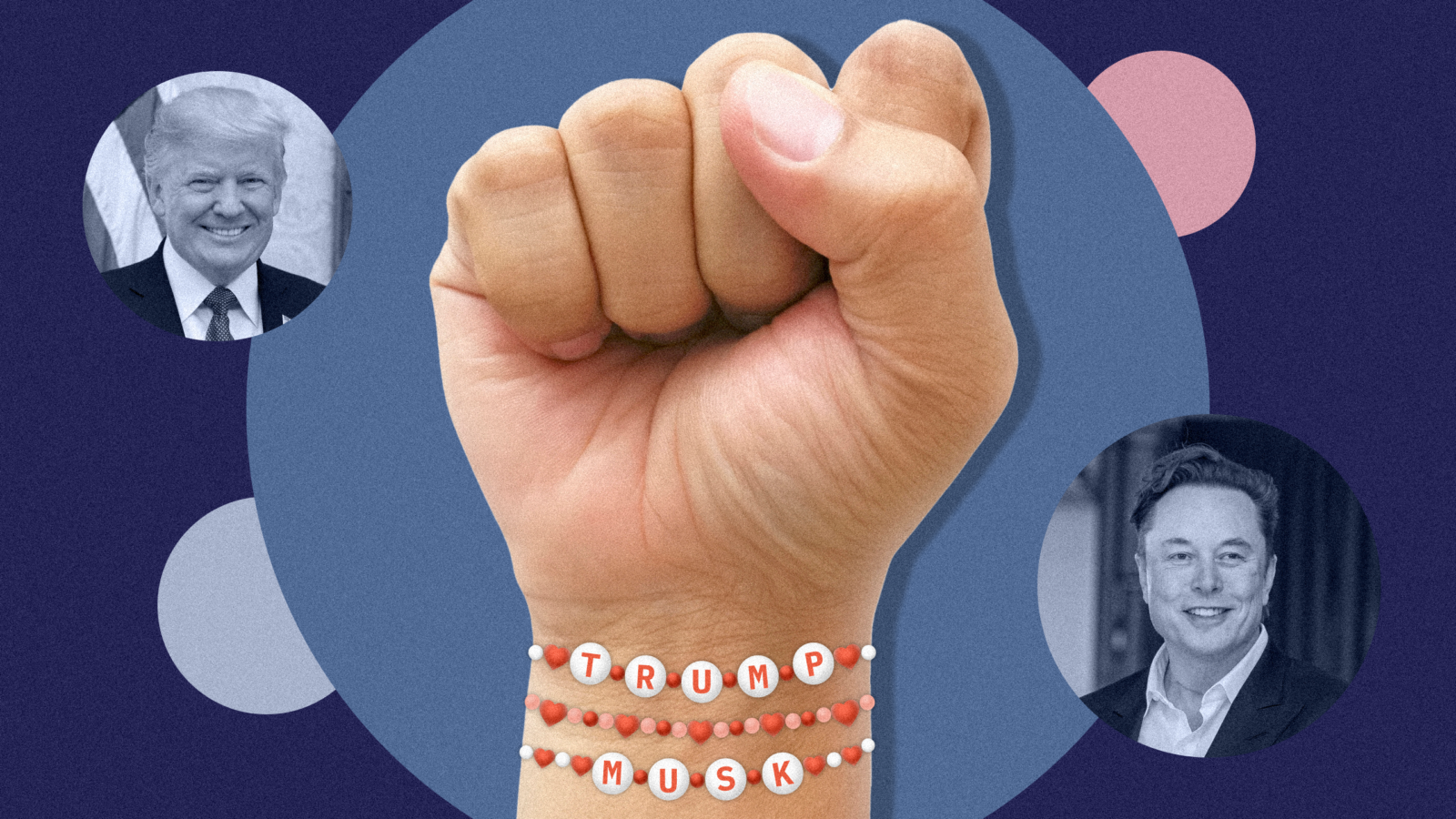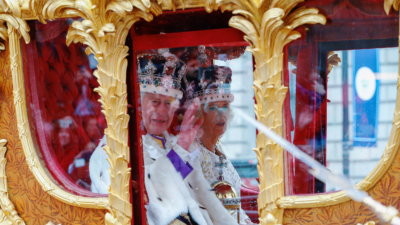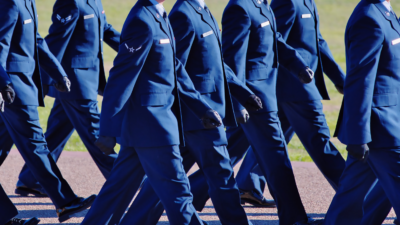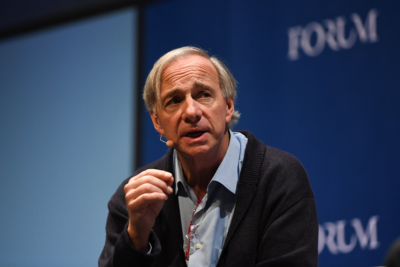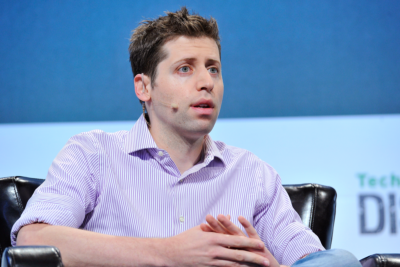New King, Old Money
Also: Tucker Carlson finally speaks, more on the Pentagon leak, and the gripings of Supreme Court Justice Samuel Alito over the abortion pill, women justices, and the Court’s “shadow docket.”
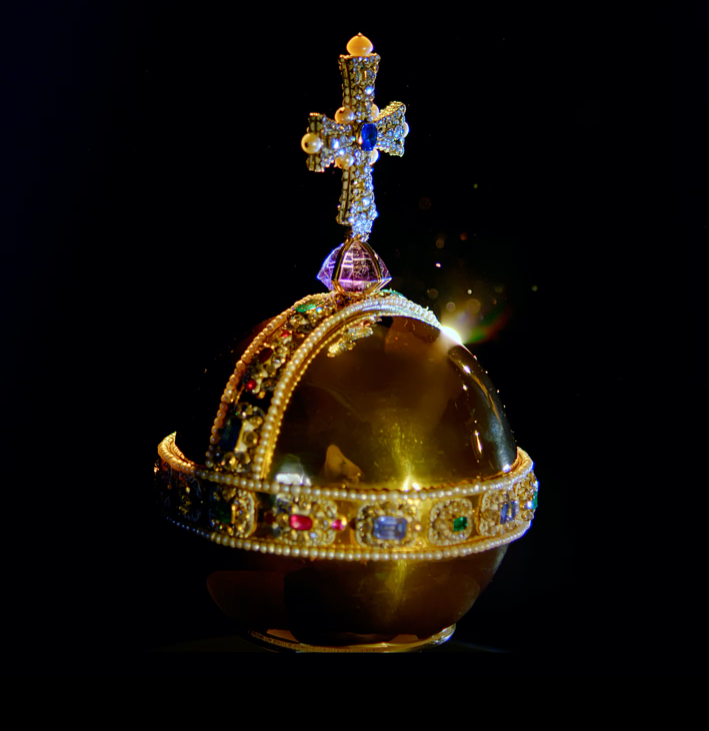
Sign up to unveil the relationship between Wall Street and Washington.
The Coronation of King Charles III is set to take place next week at Westminster Abbey.
Since Queen Elizabeth II passed away in September at the age of 96, lavish preparations for the event have kicked into high gear, dubbed Operation Golden Orb.
That is not a joke. The Royal Family really is treating May 6th like a quasi-military operation, only the code name referencing the Sovereign’s Orb held by the Queen in her coronation photo sounds just a tad sillier than you might expect. Or perhaps it’s exactly what you’d expect.
The jewel-encrusted Orb is one of the most important talismans of the Coronation regalia and, topped with a golden cross, signifies that the monarch’s power is derived directly from God.
Invoking God is very important to the royals. While Christians are specifically taught not to worship false idols, the monarch is anointed in a church and imbued with deity-like powers. The Archbishop of Canterbury, the person responsible for this, is also the highest-ranking non-royal in the United Kingdom. See how that works?
As there has not been a Coronation for 70 years – and the new King waited longer than any serving heir apparent, ever – he is going all out for his deification party.
Cecil Beaton, who took Queen Elizabeth’s official coronation photo in 1953 is dead, but King Charles has lined up royal photographer Hugo Burnand. When the King is officially crowned May 6th, his wife, Camilla, will also be crowned Queen, casting off her awkward “Queen Consort” title.
Approximately 2,000 invitations went into the Royal Mail (which is still the name of the regular mail in the UK) for the church ceremony, and the royals summoned their fleet of royal stage coaches (one of which looks dipped entirely in gold) and a selection of Crown Jewels from the Tower of London (including Queen Mary’s Crown for Camilla, decorated with 2,200 diamonds).
Andrea Bocelli, Lionel Ritchie and Katy Perry will perform in a throw-it-all-at-the-wall concert (Adele, Elton John and Harry Styles turned their invites down) and Andrew Lloyd Webber, the English composer of Phantom of the Opera and Cats, penned a new Coronation Anthem. (Years ago, I ran into Webber at a SoHo restaurant in London and he could not have possibly been a nicer fellow. He handed me a crisp calling card that read, “The Lord Andrew Lloyd Webber.” The “the” really adds a little something.)
President Biden will not be there, but First Lady Jill Biden will lead the U.S. delegation, continuing an established tradition of U.S. presidents steering clear of royal ascensions to power invoking scripture and God and deification.
King Charles also has some cool swag he’s trotting out, including a stamp bearing his visage which is reportedly more expensive than other standard stamps.
To be sure, the UK Royal Family does not enjoy the same mystique it did in the 1950s, when Queen Elizabeth was crowned. They will not be able to pull off posing as human deities anymore. And while the Coronation celebrations will be splashy and thoroughly televised, they will not erase the Royal Family’s recent wave of embarrassing scandals, tell-all books and tell-even-more documentaries.
When it comes down to it, the only aspect of the Royal Family that stands to become grander with time is their growing pile of lucre. And of all the royals, King Charles III, who now presides over a smattering of lucrative tax shelters as part of his realm, has been the most attentive to growing his largesse.
Since becoming the Duke of Cornwall as a mere toddler when his mother, took the throne, King Charles has presided over the Duchy of Cornwall, a private estate tracing back to the 1300s, with a substantial investment portfolio of 52,450 hectares of land and assets worth more than £1bn ($1.25 billion).
This estate, along with the Queen’s £650 million ($800 million) Duchy of Lancaster portfolio, comprising 18,481 hectares of land and other assets, reaped more than £40 million ($50 million) for both King Charles and the Queen during the last year of her life. That’s an estimated £1.2 billion ($1.5 billion) in total received from estates during the time they have been collecting from their duchies, adjusted for inflation. (Buckingham Palace has declined to confirm these figures, calling them “speculative.”)
Here’s the best part: While the royals pay some income tax, they are completely exempt from a corporation tax and capital gains tax, per an agreement with the UK government.
These duchies are not easy to define. They are neither trusts, nor companies, nor charities. Think of them more as special purpose vehicles for the Crown, operating as professionally run real estate investment companies, with well-paid, private asset managers overseeing investments for the monarch.
The portfolios act much like perpetual trusts, to be passed down from one generation to the next. In an interview with The Guardian, one of King Charles’s former private secretaries called the Duchy of Cornwall “a very unusual organization…It is a private estate, in many respects like other private estates, but in one or two respects, not like a private estate.”
And there are rules to how this is done. For instance, neither the monarch nor the heir to the throne, are allowed to sell off the assets for personal gain. But they are given a great deal of leeway in how they manage them.
By all accounts, King Charles plays an active role in his duchies, while the Queen reportedly showed less interest, leaving it mostly to her managers.
The Queen’s duchy activities were leaked in the Paradise Papers, showing that she had financially benefited from offshore tax shelters inside her realm, such as Bermuda and the Caymans. In the fallout, her representatives were forced to admit for the first time in 2017 that the Queen was aware she was using her overseas territories to grow her wealth.
King Charles was even more involved with his investments. At times, he was accused of running his duchy like a “modern-day fiefdom,” according to The Guardian, going so far as to build a village in Dorset in the 1990s that met his ideal of a “sustainable and architecturally pleasing community.”
When Charles became King, the Queen’s Duchy of Lancaster estate was passed on to him – and his estate, the Duchy of Cornwall, went to his son and heir-apparent, Prince William, making the latter an instant billionaire, at least on paper.
The duchies, which are effectively sprawling real estate empires, include a wide range of holdings, from medieval castles, to commercial office spaces, to farmland, to luxury real estate properties and hotels. These portfolios are not visible to the public but, in accordance with a 19th century law, the duchies must send their annual accounts to the UK Parliament.
Of course, they are also exempt from the nation’s Freedom of Information Act.
For decades, members of Parliament have called for the duchy profits to be paid to the UK Treasury. But the Royal Family insists the profits are theirs, dating back to when the country was split up into fiefdoms. It also insists the income is “private,” therefore not subject to the usual taxes. The family also sees the profits as separate from the taxpayer-funded Sovereign Grant paid annually to the Royal Family to cover its official costs. Last year, that grant came to £86.3 million ($107 million).
As King Charles looks ahead, he has made no secret of wanting to stay deeply involved in his own investments, while urging other members of the Royal Family to belt-tighten, downsize and pay their fair share on royal residencies, instead of what the British smirkingly call “mates’ rates.”
Prominently, this has resulted in the King asking his famously entitled and petulant younger brother, Prince Andrew, to move from his royal mansion in Berkshire to humbler quarters. King Charles is also greatly reducing the prince’s subsidy of $436,000 a year, which used to come from the Queen’s estate and has now passed on to the King. The Prince is reportedly “distraught” that he will now have to rely on his Navy pension.
On the less-stingy side, King Charles, who is also expecting a windfall profit from a $1.1 billion-a-year wind farm deal arranged by his estate, told the British government he would like it to be donated to “the wider public good” instead of to the Royal Family.
Just curious: If this is a Coronation donation, is it taxable?
Power Reads
A salient selection of recent reads, for your weekend gratification.
So if the best parts of your brain started to go into auto-shutdown over the country’s abortion debate — and, now, the battle over access to the abortion pill, mifepristone — a good solution would be this close read in the New Yorker by Amy Davidson Sorkin, which, on a topic that is not hilarious at all, offers a good dose of levity. It is, effectively, a comment on the comment of Supreme Court Justice Samuel Alito’s strong opposition to the Court’s latest abortion pill decision, which features, variously, his odd rants about the Court’s “shadow docket,” gripes about his fellow women justices, and how, according to Sorkin, “I’m the victim and everybody else is a hypocrite.” All of which, as Sorkin points out, is “a quite telling use of his position on the bench.”
Spoiler, this is not a read, but a video: Recently departed Fox News host Tucker Carlson finally emerged from his hiatus, issuing a video. The spot is short, but it kind of feels like forever. In it, Carlson seems to have suddenly realized he wants to talk about important issues facing the country, like war, civil liberties, demographic changes, natural resources, emerging science and corporate power. He adds that most televised news debates are “unbelievably stupid” and “completely irrelevant,” adding, “trust me as someone who’s participated.” He concludes by saying that Americans care deeply about the truth, but it can be hard to find. “The iron of the universe — true things prevail,” he notes sagely. Does he even know why he was fired?
The shocking Pentagon leak by a 21-year-old member of the Massachusetts Air National Guard has now been analyzed within an inch of its life. But there was one story out this week in Foreign Policy by Gil Barndollar, a senior fellow at Washington-based Defense Priorities, that caught my attention. “The National Guard Does Top-Secret Things — and Far Too Many Other Things,” is an excellent read considering whether the classified document leak lays bare America’s starkly overstretched military reserves.
Thanks for reading, as always, and have a great weekend!
The views expressed in this op-ed are solely those of the author and do not necessarily reflect the opinions or policies of The Daily Upside, its editors, or any affiliated entities. Any information provided herein is for informational purposes only and should not be construed as professional advice. Readers are encouraged to seek independent advice or conduct their own research to form their own opinions.
